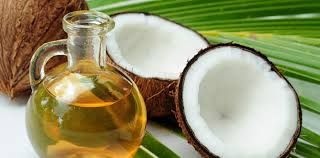 Coconut oil is famous throughout the world not only as an edible oil and hair tonic, but also as an excellent massageoil and smoothener for the skin. In the tropical parts of the world where coconuts are readily available and used in many ways, natives commonly spread coconut oil on their skin, as they believe that it protects from the sun’s harmful rays. So this natural oil, without any chemical or additives, can protect the skin in some of the hottest and sunniest places on earth better than our processed and artificial sun creams?
Coconut oil is famous throughout the world not only as an edible oil and hair tonic, but also as an excellent massageoil and smoothener for the skin. In the tropical parts of the world where coconuts are readily available and used in many ways, natives commonly spread coconut oil on their skin, as they believe that it protects from the sun’s harmful rays. So this natural oil, without any chemical or additives, can protect the skin in some of the hottest and sunniest places on earth better than our processed and artificial sun creams?
The question is, what makes coconut oil so beneficial for the skin? Before we can understand how coconut oil achieves all of its impressive benefits that people around the world claim, let’s look into the constituents of coconut oil and their respective properties that might make them useful for maintaining skin health.
Coconut Oil- Composition
Saturated Fats: Predominantly, these saturated fats are medium chain fatty acids or triglycerides. When applied on the skin, they keep it smooth to the touch. Due to the presence of these fats, coconut oil also retains the moisture content of the skin, as the fats eliminate moisture loss through the pores on skin. When ingested through the regular consumption of coconut oil, these fats deposit under the skin, thus keeping it healthy and smooth, giving it an even tone and reducing the appearance of the pores.
Capric /Caprylic/Lauric acid: These are not very different from the medium chain fatty acids, but it is still important to mention them separately here, since they have their own contributions. These three fatty acidshave strong disinfectant and antimicrobial properties. As a result, when applied on the skin, coconut oil protects from microbial infections that can get into open wounds or even enter the body through the pores. This microbial action can be experienced even if coconut oil is taken internally, as the fatty acids boost the immunity when converted to monocaprins and monolaurins.
Furthermore, capric, caprylic, and lauric acids are easily broken down chains of fatty acids, meaning that they contribute to usable energy in a quick and efficient way. This can be a major boost to your energy levels before a workout, which is why these powerful acids have also been linked to weight loss and management. Losing weight is a good way to improve the quality of your skin by reducing excess fat, stretch marks, and folds in the skin which can be unattractive. Having a healthy, toned body means that the skin maintains its tight grip around the muscles and bones.
Vitamin-E: The contributions of vitamin-E towards skin care are well known. It is essential for healthy skin growth, repair of wear & tear on the skin, keeping skin smooth and protecting against cracking. Above all, it prevents premature aging and wrinkling of the skin, since it has good antioxidant properties. 100 grams of coconut oil has about 0.1 mg of vitamin E, thus enhancing it skin-nourishing properties.
Anti-Aging Cream: Traditionally, coconut oil has been praised and popularized for its anti-aging properties.
Proteins: Like coconuts themselves, coconut oil is rich in many proteins. These proteins keep skin healthy and rejuvenated, both internally and externally. Proteins also contribute to cellular health and tissue repair, along with a wide range of other essential activities within the body. For any damaged cells on or near the skin, a healthy of flow of proteins guarantees their replacement at a normal rate, whereas people with protein-deficient diets heal slower and often develop more obvious scars due to the extended healing time.
The best property of coconut oil that makes it so beneficial for skin is that it does not become rancid. When you apply it on the skin, it can work for a longer time, unlike many other oils, without it getting rancid. Due to these various beneficial properties of coconut oil, it is used as an important ingredient in several skin care creams.
Uses of Coconut Oil for Skin Care
Coconut oil can be used for skin care in the following ways:
Lip Gel: Cracks in our lips can be a source of worry, discomfort, and embarrassment. When we apply chemical gels on the lips, it is possible to consume those gels accidentally, even though they are somewhat toxic. Some gels may be edible, but you still don’t want to eat those chemicals.
Coconut oil comes as an ideal alternative in such cases. It acts quickly and even if it goes in your stomach, it will only give you additional benefits, so everyone wins!
Skin softener: Most of us use several creams and lotions for softening our skin, especially the skin of the face and hands. Coconut oil is a great skin softener and helps you do away with dry and hard skin conditions. Simply take some coconut oil on your palms, rub your palms against each other once or twice and then on your face, hands, or wherever you want to see the moisturizing effect.
Coconut oil is also good for hardened and cracked feet, which may happen due to excessive cold or strenuous work while standing on your feet. The cracks in your feet will not vanish, but your feet will become softer within days if you apply coconut oil to the affected area.
As an exfoliant, including coconut oil as an agent with other exfoliating or grainy materials like salts and sugars can vastly improve the effects. You will successfully scrape off excess dead skin and clean out whatever substances have blocked the pores without leaving the skin feeling irritated. The natural soothing nature of the oil combines with the grainy, exfoliating material perfectly, and leaves your skin with an even color, closed pores, and a soft texture.
Makeup Remover: Coconut oil can also be used a makeup remover. This is not common, but women have begun using it for removing the makeup of the face and eyes, without worrying about the harsh chemicals of other removers getting into delicate or sensitive areas.
Skin disorders: It is claimed that coconut oil is good for several skin disorders such asacne, psoriasis, and eczema. Several readers have reported this benefit. However, scientific research is ongoing in order to prove or disprove these claims. Much of the research that is there speaks to its protein content, since the replacement of sick or dying cells that can occur with various skin disorders, are quickly replaced by new, healthy cells. In this way, coconut oil not only treats the infection by battling the microbial bodies, they also heal the damage or the visible marks of that skin disorder; it is a two-in-one solution!
How To Use Coconut Oil
For many who have never used coconut oil, its various applications can be confusing. You should try to buy coconut oil in a jar which has a broad opening. In colder climates, coconut oil can be solid, like a cream. However, in warm temperatures, it comes as a liquid. For skin care use, take some coconut oil, either solid or liquid, on your palm. Then, rub your palms together and onto the skin of the desired area. You can also put the coconut oil on a piece of cotton and rub the cotton onto your skin. However, it is not necessary to reapply coconut oil as often as other natural skin care oils. You only need a small amount to create a protective shield on your skin that will last for a long time.
Many people make the mistake of using too much coconut oil, and since the skin can only absorb a certain amount, the protective layer that the absorbed oil creates doesn’t let any more oil in! This means that if you use too much, too often, your skin will end up as an oily mess, and will look shiny or greasy, not to mention what it might do to your clothes! Then, go get yourself some coconut oil and bring your skin back to its natural beauty!



